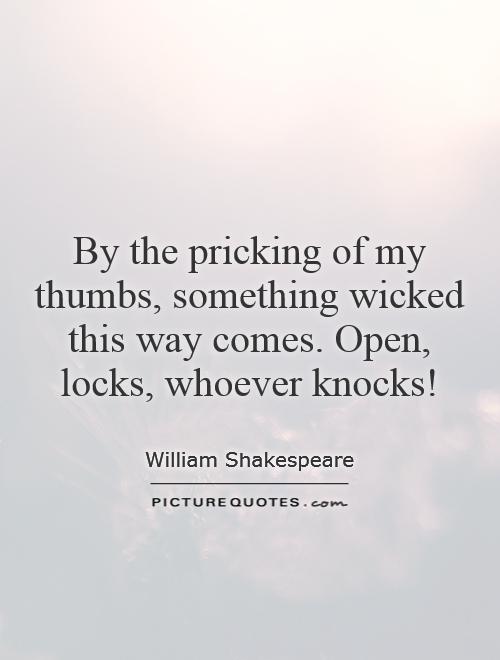By the pricking of my thumbs, something wicked this way comes. Open, locks, whoever knocks!

By the pricking of my thumbs, something wicked this way comes. Open, locks, whoever knocks!
"By the pricking of my thumbs, something wicked this way comes. Open, locks, whoever knocks!" These iconic lines are spoken by the character of the Second Witch in Act 4, Scene 1 of William Shakespeare's play Macbeth. The play, written in the early 17th century, is a tragedy that tells the story of a Scottish general, Macbeth, who becomes consumed by ambition and ultimately descends into madness and tyranny.The Second Witch's ominous words foreshadow the arrival of the play's central antagonist, Macbeth himself. The use of the word "pricking" suggests a sense of unease or foreboding, as if the character's intuition is warning her of something sinister on the horizon. The phrase "something wicked this way comes" is a chilling reminder of the evil deeds that Macbeth is about to commit in his quest for power.
The command to "Open, locks, whoever knocks!" further emphasizes the sense of impending doom. The idea of unlocking doors for whoever is knocking suggests a lack of control or agency, as if the characters are powerless to stop the evil forces that are descending upon them. It also serves as a metaphor for the characters' moral descent, as they are forced to confront the consequences of their actions.
Shakespeare's use of language in this passage is masterful, creating a sense of tension and suspense that builds throughout the play. The repetition of the word "knocks" adds to the sense of urgency, as if the characters are being inexorably drawn towards their fate. The imagery of locks being opened also symbolizes the characters' inner turmoil and the breaking down of barriers between right and wrong.
Overall, these lines from Macbeth are a powerful reminder of the destructive power of unchecked ambition and the consequences of giving in to one's darkest impulses. Shakespeare's timeless exploration of human nature and the consequences of our actions continues to resonate with audiences today, making Macbeth a classic work of literature that remains as relevant and thought-provoking as ever.












 Friendship Quotes
Friendship Quotes Love Quotes
Love Quotes Life Quotes
Life Quotes Funny Quotes
Funny Quotes Motivational Quotes
Motivational Quotes Inspirational Quotes
Inspirational Quotes